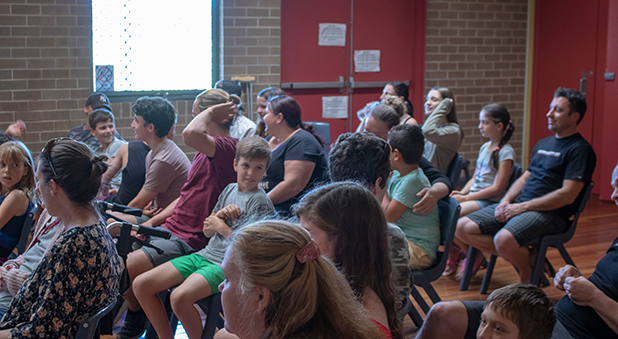Park Rail Anglican Church was planted to reach the 7500 people who didn't have access to a Church. Typically, Anglican Churches haven't thrived in areas like this, but there is something special going on here.
“Park Rail is a low socioeconomic area and characteristically Anglican churches have not thrived in these conditions, but we’ve been very encouraged by the growth both numerically and spiritually,” Mr Scott says.
The church is growing by about eight people each year and most of these have been converted from the community or surrounds. It operates also slightly differently from your standard, middle-class Anglican church.
“In a low socioeconomic area, the currency of the community is relationships,” Mr Scott explains. “In general, families are fractured and blended and we see more dysfunction in people’s lives than in middle-class areas. Due to the currency of relationships and damage in people’s lives, we do not run group Bible studies but rather one-to-one discipling that increases honesty and accountability.”
If this all sounds like an innovative strategy, Mr Scott is quick to put it down to accidental discoveries and God’s wisdom.
“I think most of the things we've discovered have been by accident,” he says. “Because we couldn't have a church building, instead of inviting people to a program that we run – other than the church service in the community centre – it made everyone go out into the community and be in people's houses. So we weren't a programs church, but rather a really highly directed, relational, one-to-one discipling church. That has been purely by God's grace and once again, accident.”
The time for Sunday church can vary a lot: 8am, 10.30am, 6pm and now even 4pm – but 1.30pm? That’s the time Park Rail Anglican Church meets, and it works.
“Actually we start at 12.30 or so and have lunch first, then church is at 1.30,” says the Rev Neil Scott, leader of the Park Rail church plant, which started six years ago as an outreach from the parish of Albion Park Rail, south of Wollongong.
He adds that, with the service time, “I'd love to say that we were really clever and strategically thought out things, but what actually happened is that I was already leading and sometimes preaching at three services as an assistant minister at Albion Park. So [1.30pm] was the only time slot that was available for the church plant.
“What we soon recognised is that a lunchtime start gives people a really slow, relaxed day. Our church is not a short, sharp hour and then gone. Church is the main event for people’s day. They come in, they eat and spend time together. They stay for three hours sometimes, you know – even after the service is finished they are out in the car park talking.”
Mr Scott spends half of his time in the community, as a chaplain to a local school and teaching SRE, and the other half equipping and training up the congregation. And Park Rail, with oversight from Evangelism and New Churches, is already looking to the future.
“More than half our congregation is kids or teenagers and therefore we are constantly training up high school students to be involved in the life of the church, as Jesus was involved in the religious life of his community after the age of 12,” he says.
“The young leadership base is strong and we are looking forward to seeing God’s faithfulness to the next generation. We would love people to partner with us both prayerfully and financially because we’ve seen a model of church flourish in a low socioeconomic area and we’re thinking that in the next three years we’d like to plant another church in the Illawarra. We would employ a tentmaker to come in and join the church for two years to see how it runs and then go and plant another church in a neighbouring suburb.”
Photo courtesy Daniel Jaques


























